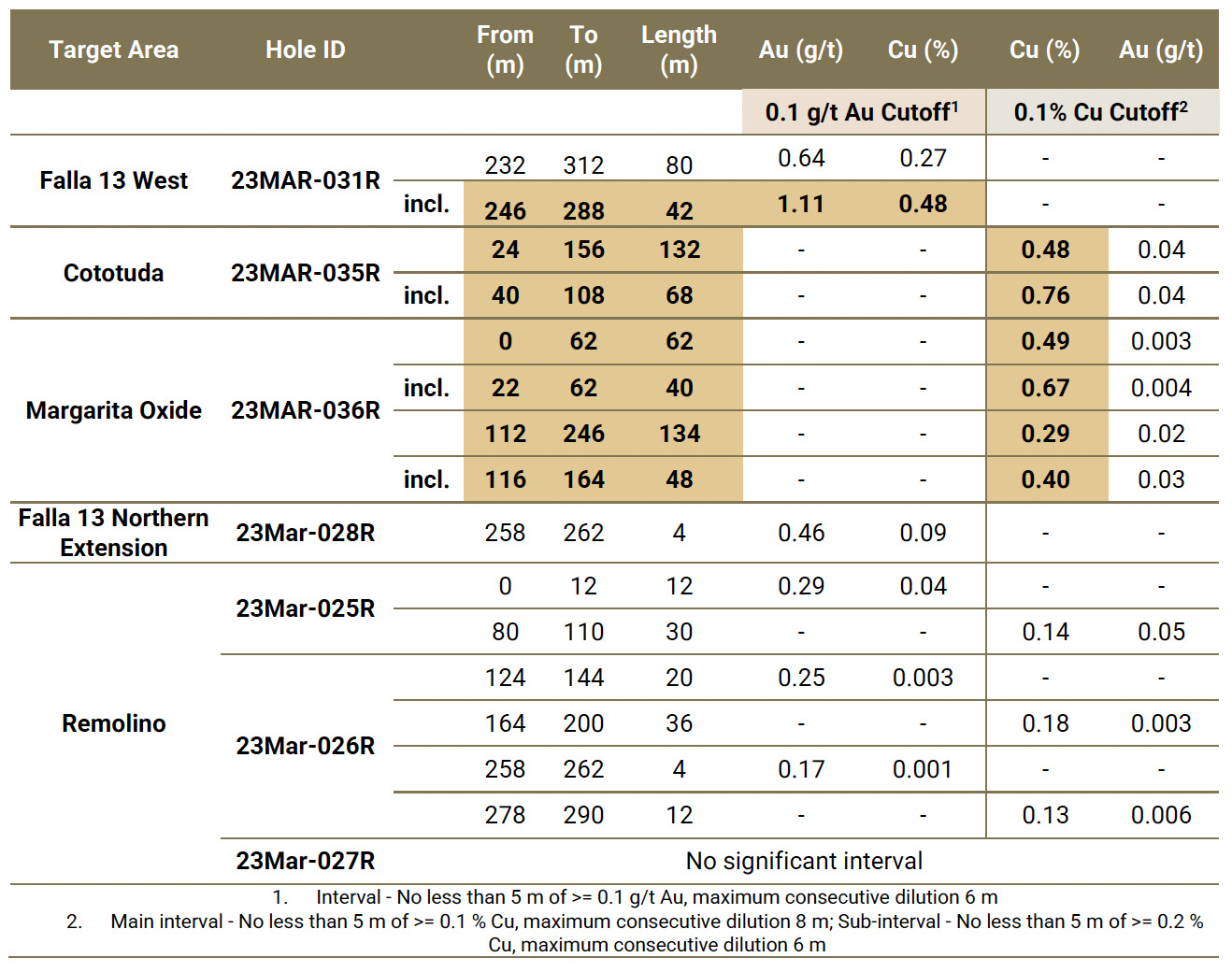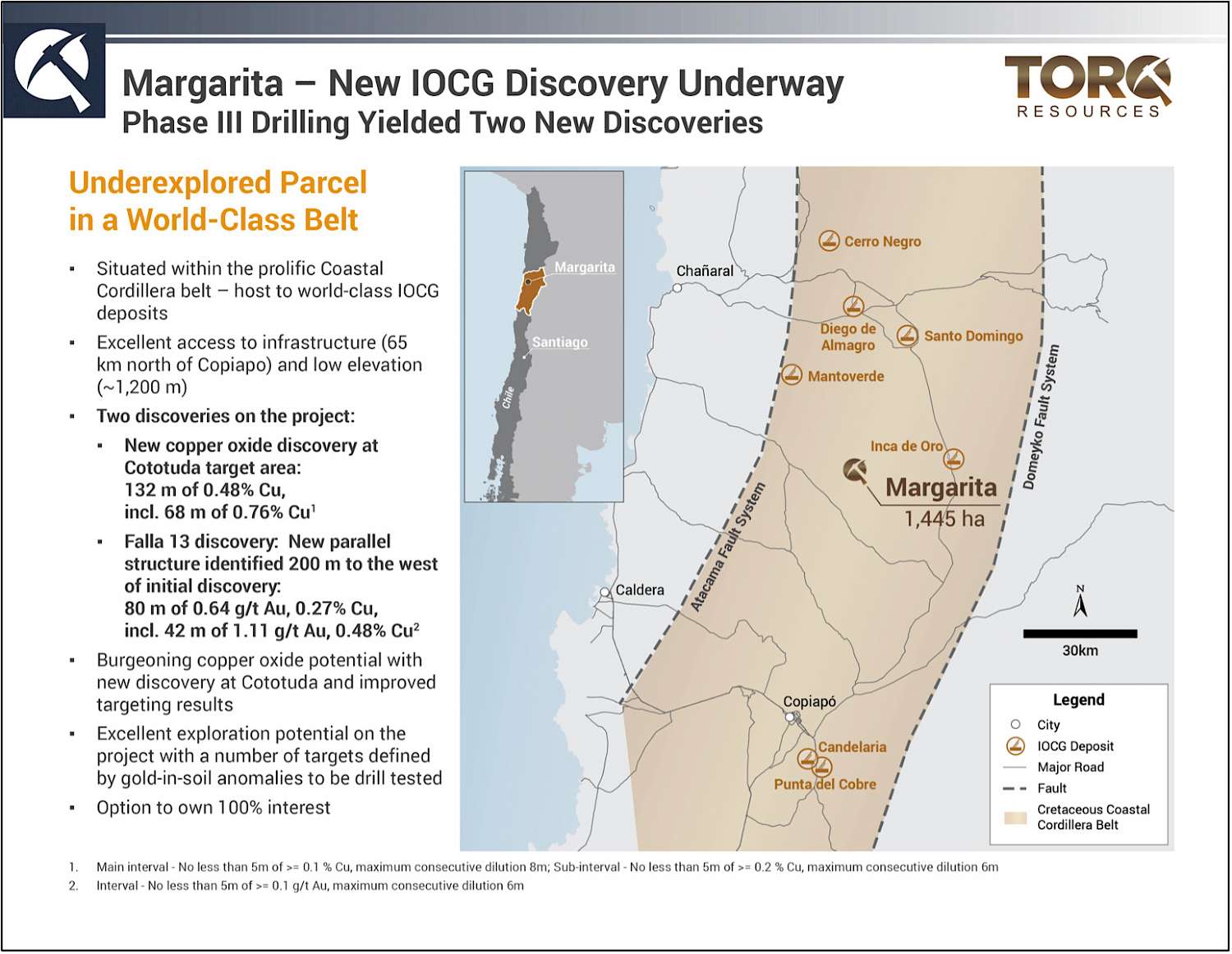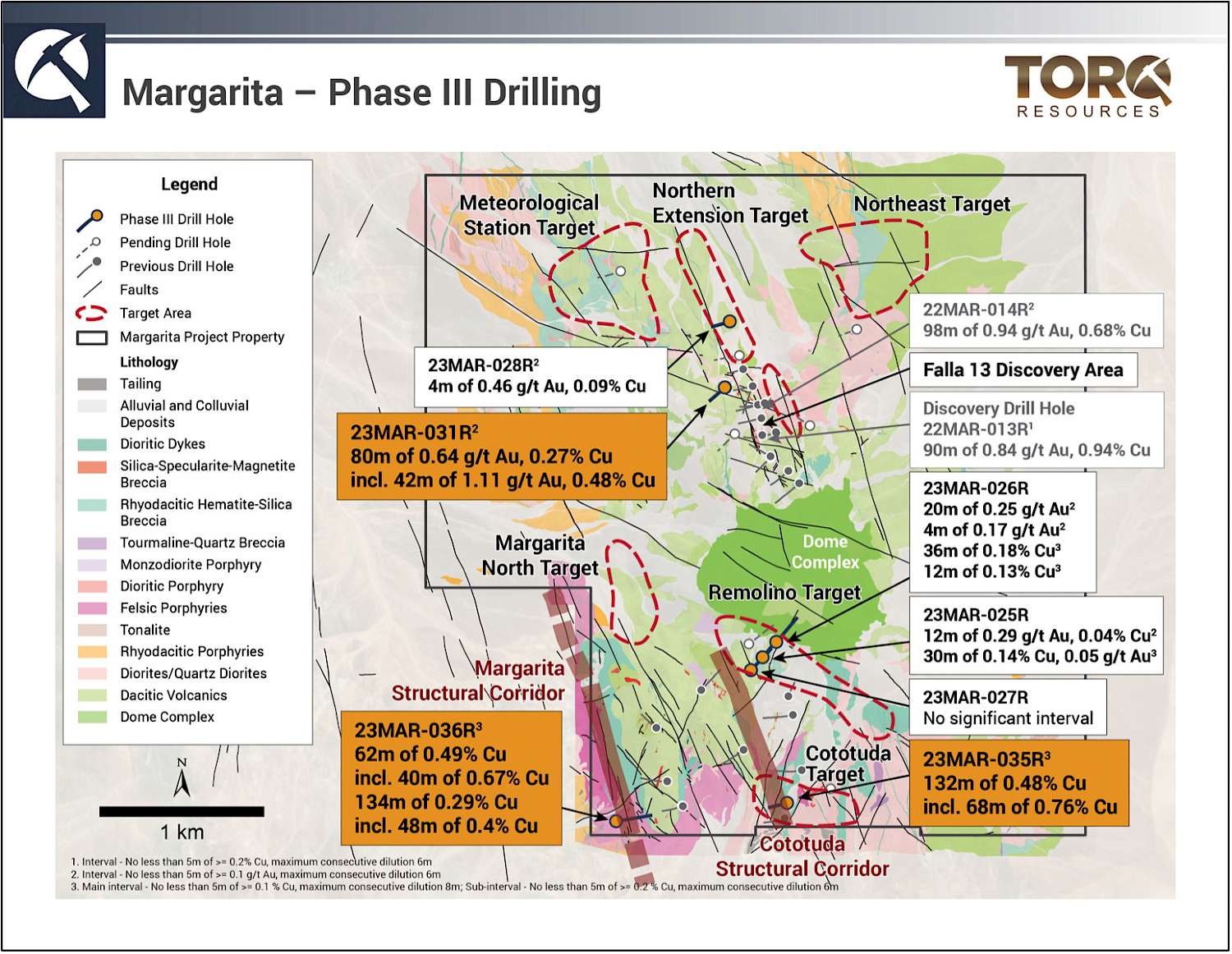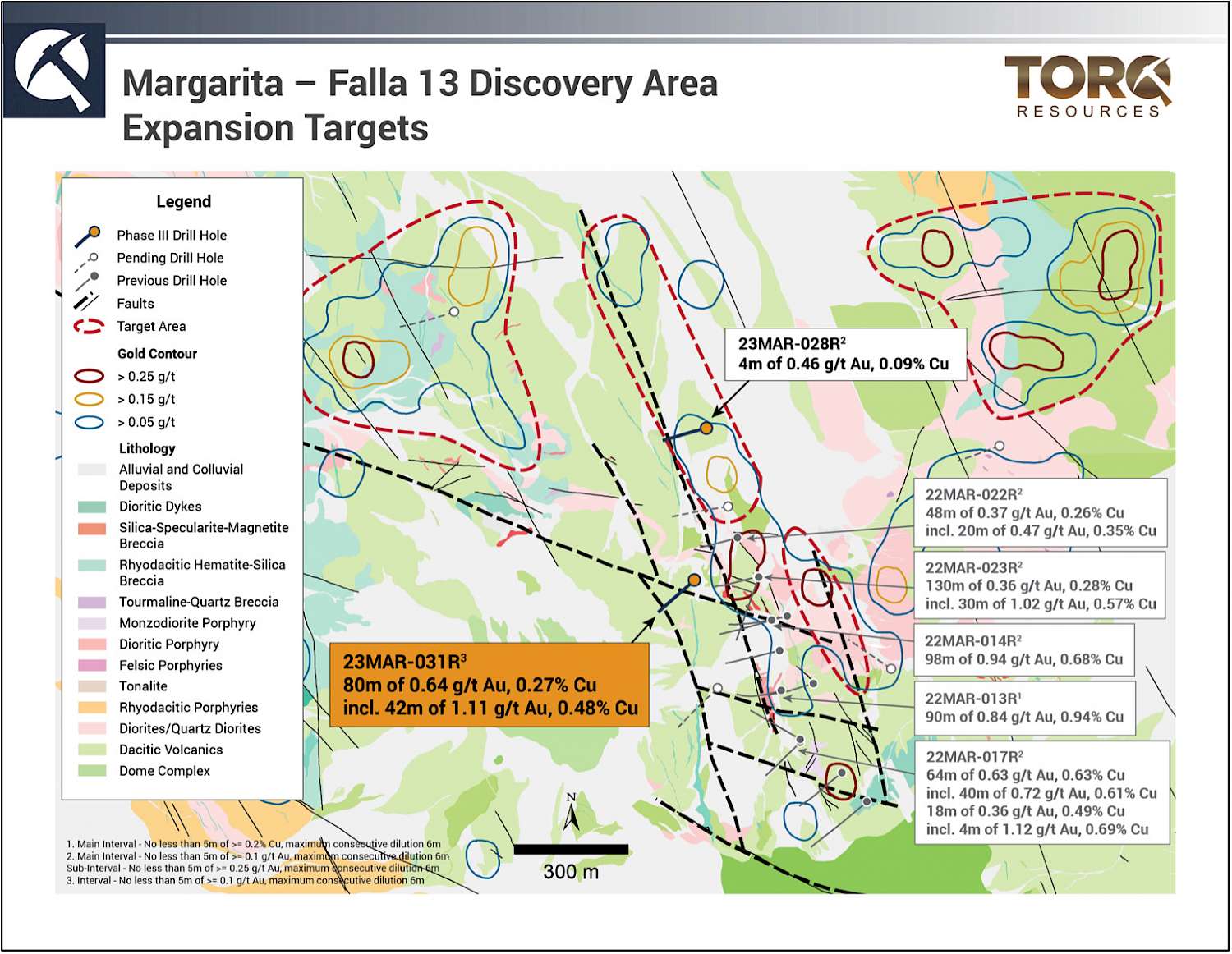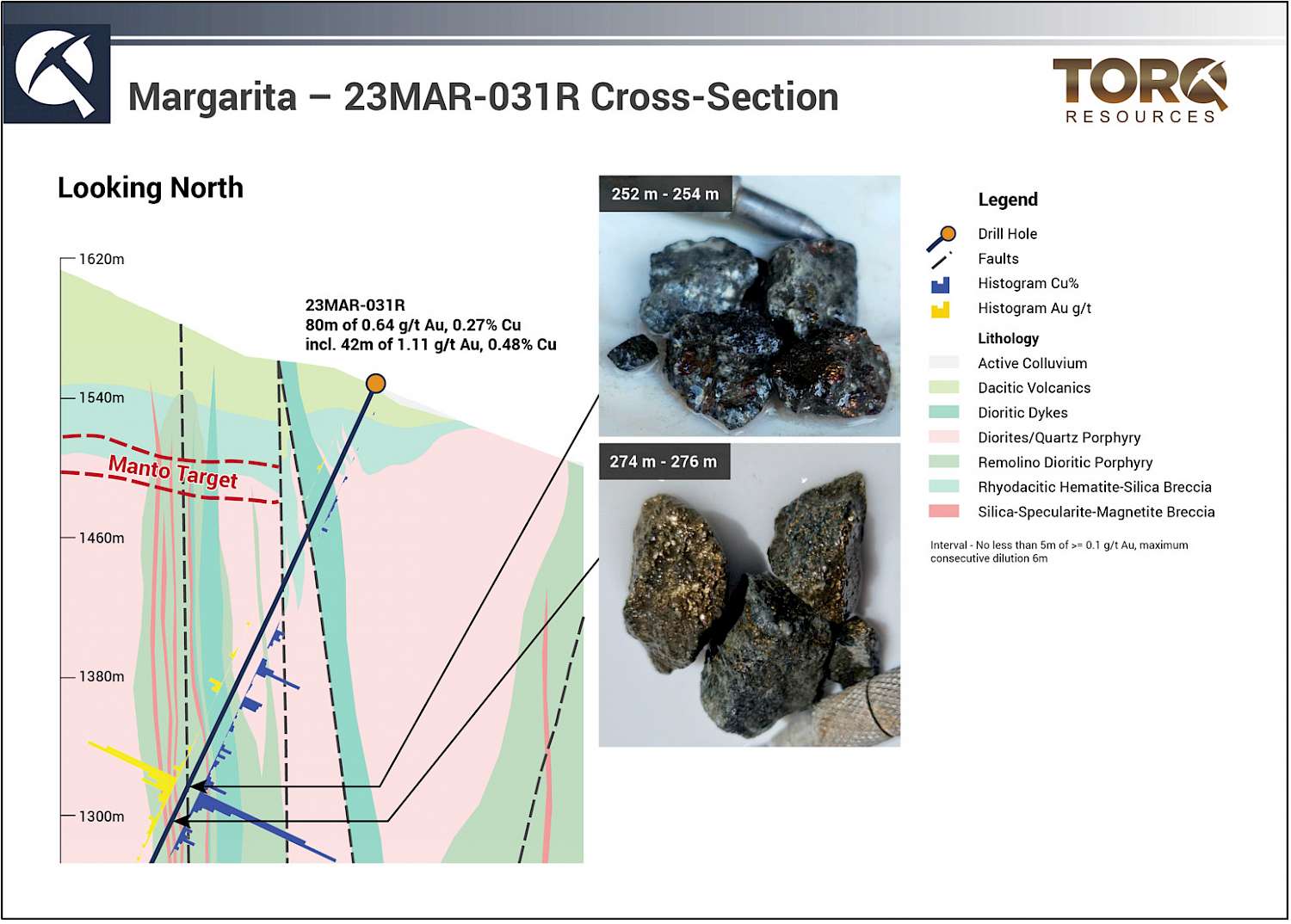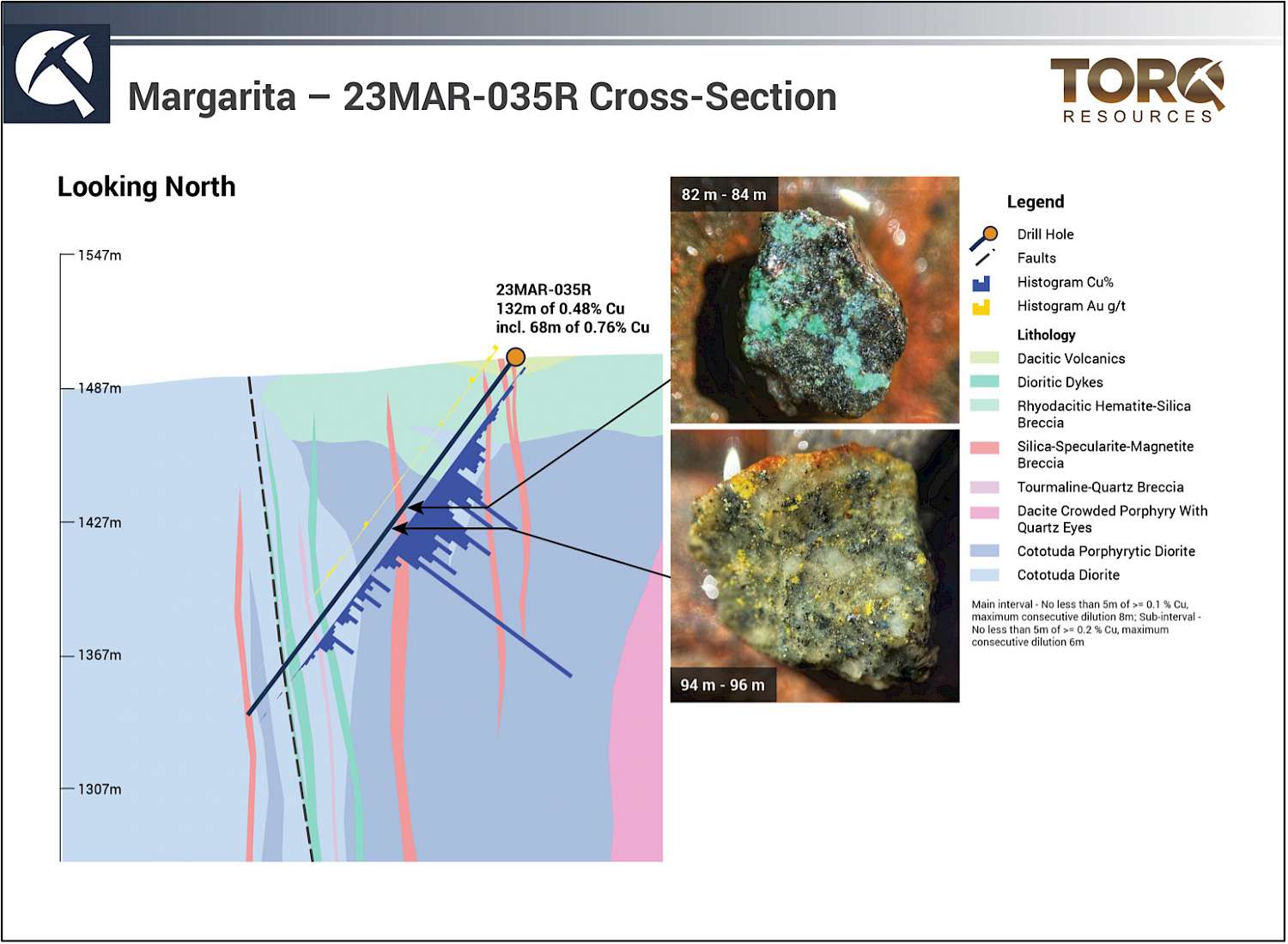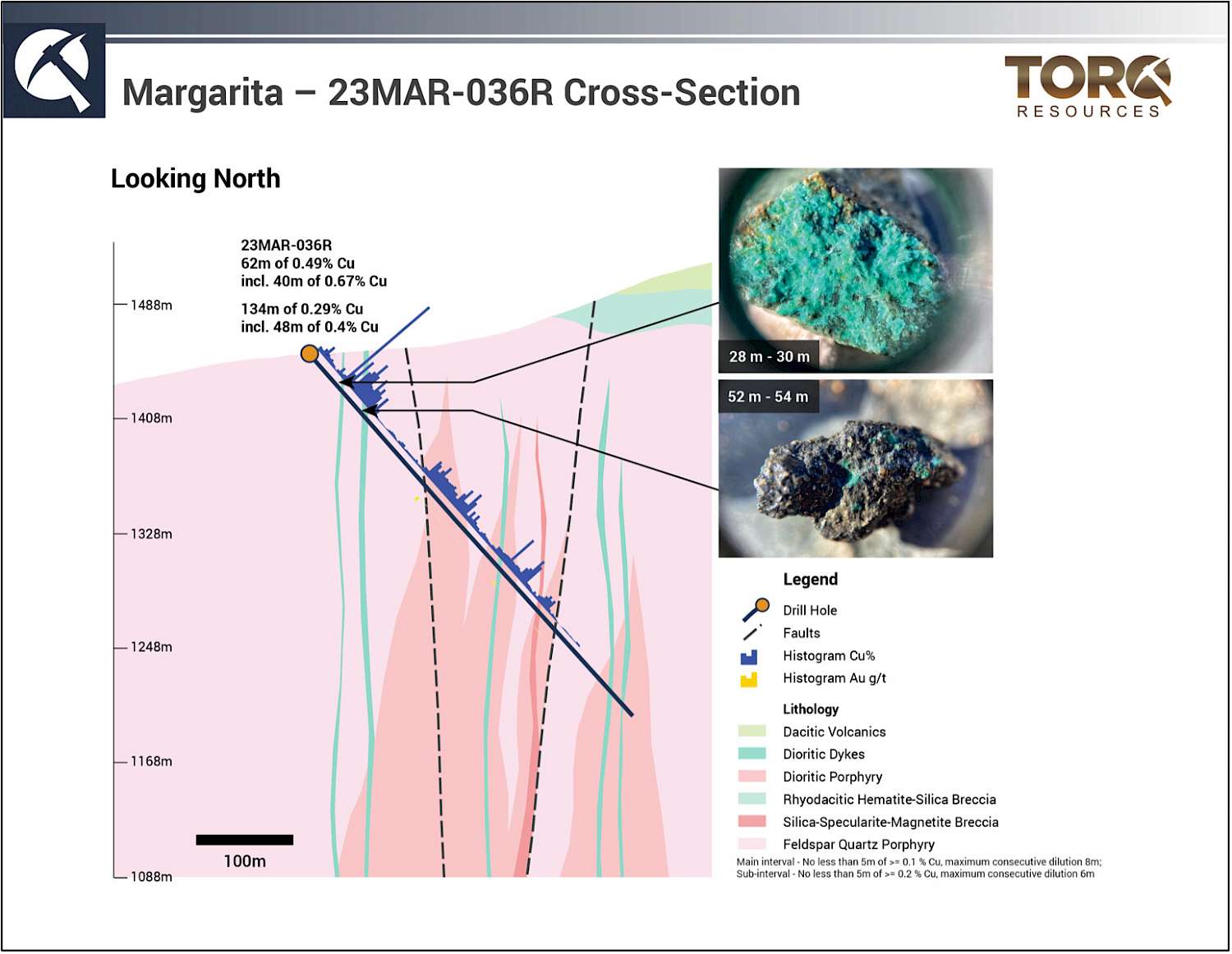Vancouver, Canada – October 18, 2023 – Torq Resources Inc. (TSX-V: TORQ, OTCQX: TRBMF) (“Torq” or the “Company”) is pleased to announce the first set of results from its phase III drill program at its Margarita iron-oxide-copper-gold (IOCG) project located approximately 65 kilometres north of the city of Copiapo in Chile (Figure 1). The program, which consisted of 14 drill holes over 3,862 metres (m), successfully accomplished the Company’s main objectives of: 1) expanding on the original Falla 13 discovery area and 2) discovering a new mineralized body to demonstrate the scale and potential of the mineralized system that encompasses the Margarita project.
The phase III drill program identified a new parallel mineralized structure 200 m west of the original Falla 13 discovery, intersecting 42 m of 1.1 g/t gold and 0.48% copper of sulphide mineralization in drill hole 23MAR-031R and in addition, a new zone of copper oxide mineralization was discovered in the southern area of the project at the Cototuda target, where 132 m of 0.48% copper was intersected in drill hole 23MAR-035R (Figure 2). Finally, broad zones of copper oxide mineralization were encountered at the historically drilled Margarita structural corridor, at the southwest limit of the property, where Torq drilled 62 m of 0.49% copper and 134 m of 0.29% copper in drill hole 23MAR-036R. Table 1 below summarizes highlights from the phase III drill program from the seven reported drill holes. Results from the remaining seven drill holes are pending.
A Message from Shawn Wallace, CEO:
“We are very pleased to have multiple discoveries to pursue at our Margarita project, which is advantageously located near a major city, roads and power, and where we can drill year-round because of the low elevation. The discovery of additional bodies of mineralization on the property has significantly enhanced the value proposition for Torq at Margarita. We look forward to further drilling to continue to unlock the project’s growth potential.”
A Message from Michael Henrichsen, Chief Geological Officer:
“The two discoveries we have made in our third phase of drilling significantly increase the potential scale of the Margarita project. With the identification of a parallel structure to the Falla 13 discovery area, we demonstrate that the mineralization is wide open to the west, and in addition, our second discovery at the Cototuda target demonstrates the potential to define a new body of copper oxide mineralization. Margarita continues to improve as we learn more about the project, and we believe that with further drilling we can elevate Margarita to become a significant project in the Coastal Cordillera belt, where there are numerous nearby producers.”
Table 1: Summary of drill results
Technical Discussion:
Falla 13 Discovery Area:
Drill hole 23MAR-031R is located approximately 200 m west of the original Falla 13 discovery structure in a zone of significant surfacial iron oxides, without a strong gold or copper signature on surface (Figure 3). The drill hole intersected 42 m of 1.1 g/t gold and 0.48% copper (246 m – 288 m in depth) within a broader interval of 80 m of 0.64 g/t gold and 0.27% copper (232 m – 312 m in depth). The mineralization was encountered within a suite of dioritic porphyry bodies that are situated below the key volcanic – intrusive contact zone, which thus far has defined the position of mineralization along the 800 m long Falla 13 discovery (Figure 4). The gold – copper mineralization is associated with a pyrite – chalcopyrite – magnetite and/or hematite mineral assemblage with alteration within the mineralized interval characterized as strongly sericitic. At this early stage, Torq’s technical team has interpreted the mineralization to be hosted in a north-northwest trending structure that is parallel to the Falla 13 discovery and that has been mapped on surface and within geophysics over a 1,200 m strike length, demonstrating considerable exploration potential.
Importantly, given that the mineralization encountered in drill hole 23MAR-031R is situated 200 m vertically below the sub-horizontal volcanic-intrusive contact zone, the depth potential for mineralization has increased dramatically within the Falla 13 discovery area. The mineralization is interpreted as being hosted in a feeder structure, with mineralization open vertically upward. The primary targets are the volcanic-intrusive contact zone, where there is the potential for flat-lying manto-style mineralization, and the strike length of the structure. The Company is currently planning a set of follow-up drill holes to explore along the north-northwest trending structure, as well as to test for adjacent flat-lying manto-style mineralization both to the east and west of drill hole 23MAR-031R.
Cototuda and Margarita Target Areas:
Drill hole 23MAR-035R is located on the north-northwest trending Cototuda structural corridor, approximately 150 m from the property boundary and the small-scale Cototuda copper oxide mine situated just to the south of the property boundary (Figure 2). The drill hole intersected 132 m of 0.48% copper (including 68 m of 0.76% copper) at a depth of 24 m – 156 m and is characterized by malachite, chalcocite, chrysocolla and black copper oxide minerals within a series of hematite – silica breccia bodies and dioritic intrusives that contain minor amounts of pyrite (Figure 5). The structural corridor is open along strike to the north-northwest for 750 m and represents an excellent opportunity to expand upon this second discovery on the project.
Drill hole 23MAR-036R is located on the north-northwest trending Margarita structural corridor where limited historical drilling in the mid-1990s encountered copper oxide mineralization in the southwest corner of the project. The purpose of drill hole 23MAR-036R was to evaluate the validity of the historical data and to determine the potential to define a coherent body of copper oxide mineralization within the structural corridor. Drill hole 23MAR-036R intersected two broad zones of copper oxide mineralization, including 62 m of 0.49% copper (including 40 m of 0.67% copper) from surface and 134 m of 0.29% copper (including 48 m of 0.40% copper) at a depth of 112 m – 246 m (Figure 6). Mineralization within both intervals was characterized by chrysocolla, malachite, chalcocite and black copper oxide minerals within a feldspar porphyry crosscut by a series of dioritic dykes. The results from drill hole 23MAR-036R exceed the historical results and demonstrate that copper oxide mineralization occurs at greater depths.
Remolino Target Area:
At the Remolino target area, a fence of three drill holes was designed to test a coincident magnetic and gold-in-soils geochemistry anomaly that had similar characteristics as the original Falla 13 discovery. Of the three drill holes, two intersected anomalous copper and/or gold mineralization, including 12 m of 0.29 g/t gold from surface and 30 m of 0.14% copper (80 m – 110 m in depth) in drill hole 23MAR-025R and 20 m of 0.25 g/t gold (124 m – 144 m in depth) and 36 m of 0.18% copper (164 m – 200 m in depth) in drill hole 23MAR-026R. Importantly, copper mineralization at Remolino is characterized by intervals of secondary chalcocite copper oxide mineralization, indicating the possibility of a proximal copper sulphide source to the mineralization encountered in the Remolino drill holes.
Next Steps:
Based on the new discovery of copper oxide mineralization at the Cototuda target and the long broad intervals of mineralization encountered at the Margarita copper oxide zone, the Company is planning on initial metallurgical test work from both zones to determine the leaching characteristics of the oxide mineralization encountered. In addition, a follow-up drill program is currently being planned on the newly discovered mineralized structure adjacent to the Falla 13 discovery, as well as along the Cototuda structural corridor and to test several remaining undrilled target areas.
Figure 1: Illustrates the location of the Margarita project within the Coastal Cordillera belt and its proximity to major deposits in the region.
Figure 2: Illustrates the position of the discovery holes, 23MAR-031R and 23MAR-035R, at the Falla 13 and Cototuda target areas, respectively, as well as the significant copper oxide mineralization encountered in drill hole 23MAR-036R at the Margarita structural corridor.
Figure 3: Illustrates the position of the new discovery of a parallel mineralized structure 200 m west of the original Falla 13 discovery. Importantly, there is considerable strike length, over 1,200 m, to explore along this newly identified structural corridor, as well as along the series of west-northwest trending cross structures.
Figure 4: Illustrates a cross-section of the mineralization discovered in drill hole 23MAR-031R where 42 m of 1.11 g/t gold and 0.48% copper was intersected on a structure 200 m west of the Falla 13 discovery. Note that mineralization is open vertically upward toward surface for 200 m vertical to the manto target at the contact between the volcanic and intrusive units. Mineralization is characterized by chalcopyrite and pyrite within magnetite breccias, as illustrated in the photo from 252 m – 254 m depth, and within disseminated chalcopyrite and pyrite within the host dioritic intrusive, as illustrated in the photo from 274 m – 276 m depth.
Figure 5: Illustrates a cross-section of the mineralization discovered in drill hole 23MAR-035R at the Cototuda target where 132 m of 0.48% copper was intersected. Mineralization is characterized by malachite, as illustrated in the photo from 82 m – 84 m depth and by chalcocite covering pyrite grains, as illustrated in the photo from 94 m – 96 m depth.
Figure 6: Illustrates a cross-section of the mineralization encountered in drill hole 23MAR-036R at the copper oxide target on the Margarita structural corridor, where two broad intervals of copper oxide were defined including intercepts of 62 m of 0.49% copper and 134 m of 0.29% copper. Mineralization within both intervals is in malachite, as illustrated in the photo from 28 m –30 m depth, and by black copper oxide, as illustrated in the photo from 52 m –54 m depth.
Michael Henrichsen P.Geo, Torq’s Chief Geological Officer, is the qualified person as defined by NI 43-101 (Standards of Mineral Disclosure) who assumes responsibility for the technical contents of this press release.
ON BEHALF OF THE BOARD,
Shawn Wallace
CEO
For further information on Torq Resources, please visit www.torqresources.com or contact Natasha Frakes, VP, Communications, at (778) 729-0500 or [email protected].
About Torq Resources
Torq is a Vancouver-based copper and gold exploration company with a portfolio of premium holdings in Chile. The Company is establishing itself as a leader of new exploration in prominent mining belts, guided by responsible, respectful and sustainable practices. The Company was built by a management team with prior success in monetizing exploration assets and its specialized technical team is recognized for their extensive experience working with major mining companies, supported by robust safety standards and technical proficiency. The technical team includes Chile-based geologists with invaluable local expertise and a noteworthy track record for major discovery in the country. Torq is committed to operating at the highest standards of applicable environmental, social and governance practices in the pursuit of a landmark discovery. For more information, visit www.torqresources.com.
Margarita RC Drilling
Analytical samples were taken using 1/8 of each 2 m interval material (chips) and sent to ALS Lab in Copiapo, Chile for preparation and then to ALS Labs in Santiago, Chile and Lima, Peru for analysis. Preparation included crashing core sample to 90% < 2mm and pulverizing 1,000 g of crushed material to better than 85% < 75 microns. All samples are assayed using 50 g nominal weight fire assay with AAS finish (Au-AA24), multi-element four acid digest ICP-AES/ICP-MS method (ME-MS61), and copper sulphuric acid leach with AAS finish (Cu-AA05). Where MS61 results were greater or near 10,000 ppm Cu the assays were repeated with ore grade four acid digest method (Cu-OG62). QA/QC programs for 2023 RC drilling samples using internal standard samples, field and lab duplicates, standards and blanks indicate good accuracy and precision in a large majority of standards assayed.
True widths of mineralization are unknown based on current geometric understanding of the mineralized intervals.
Canadian mineral terminology and standards differ from those of other countries. The Company’s public disclosure filings highlight some of these differences.
Forward Looking Information
This release includes certain statements that may be deemed “forward-looking statements”. Forward-looking information is information that includes implied future performance and/or forecast information including information relating to, or associated with, exploration and or development of mineral properties. These statements or graphical information involve known and unknown risks, uncertainties and other factors which may cause actual results, performance or achievements of the Company to be materially different (either positively or negatively) from any future results, performance or achievements expressed or implied by such forward-looking statements. For a discussion of risk factors which could adversely affect the forward looking statements, see the Company’s public record filings at www.sedarplus.ca.
Neither the TSX Venture Exchange nor its Regulation Services Provider (as that term is defined in the policies of the TSX Venture Exchange) accepts responsibility for the adequacy or accuracy of this release.

